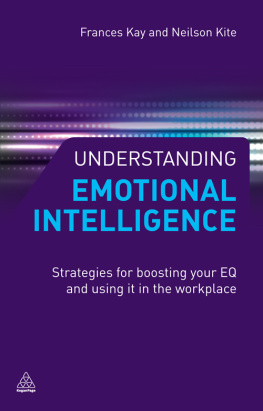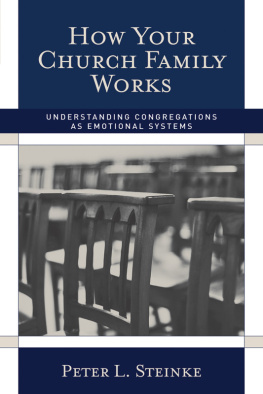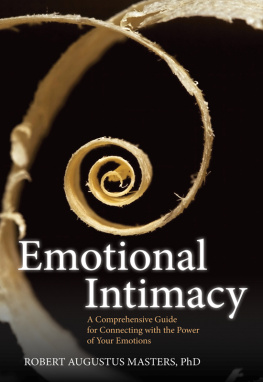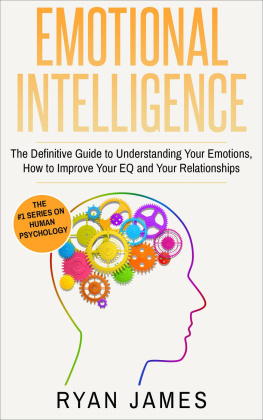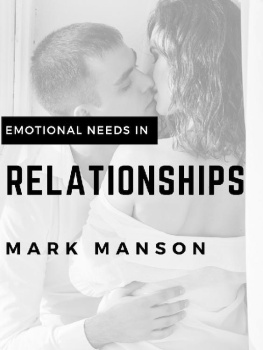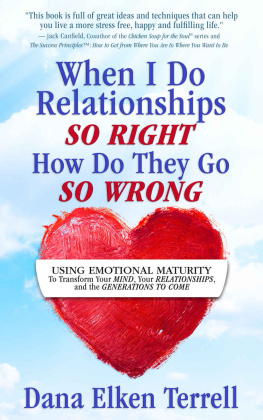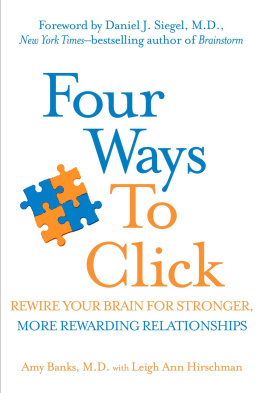Living on Automatic
How Emotional Conditioning Shapes Our Lives and Relationships
Homer B. Martin, MD, and Christine B. L. Adams, MD
Foreword by Mary E. Schwab, MD, MAR

Copyright 2018 by Martin and Adams, LLC
All rights reserved. No part of this publication may be reproduced, stored in a retrieval system, or transmitted, in any form or by any means, electronic, mechanical, photocopying, recording, or otherwise, except for the inclusion of brief quotations in a review, without prior permission in writing from the publisher.
Library of Congress Cataloging-in-Publication Data
Names: Martin, Homer B., MD, author. | Adams, Christine B. L., MD, author.
Title: Living on automatic : how emotional conditioning shapes our lives and relationships / Homer B. Martin, MD, and Christine B. L. Adams, MD; foreword by Mary E. Schwab, MD, MAR.
Description: Santa Barbara : Praeger, [2018] | Includes bibliographical references and index.
Identifiers: LCCN 2018012896 (print) | LCCN 2018018529 (ebook) | ISBN 9781440865190 (ebook) | ISBN 9781440865183 (hardcopy : alk. paper)
Subjects: LCSH: Emotions. | Interpersonal relations.
Classification: LCC BF511 (ebook) | LCC BF511 .M277 2018 (print) | DDC 155.9/24dc23
LC record available at https://lccn.loc.gov/2018012896
ISBN: 978-1-4408-6518-3 (print)
978-1-4408-6519-0 (ebook)
22 21 20 19 18 1 2 3 4 5
This book is also available as an eBook.
Praeger
An Imprint of ABC-CLIO, LLC
ABC-CLIO, LLC
130 Cremona Drive, P.O. Box 1911
Santa Barbara, California 93116-1911
www.abc-clio.com
This book is printed on acid-free paper 
Manufactured in the United States of America
To our patients for their bravery in seeking self-understanding
The circumstances of the world are so variable that an irrevocable purpose or opinion is almost synonymous with a foolish one.
William H. Seward (18011872) (Secretary of State, 18611869; negotiated 1867 purchase of Alaska; opponent to spread of slavery before the United States Civil War)
Contents
Mary E. Schwab, MD, MAR
Homer B. Martin, MD
Christine B. L. Adams, MD
Foreword
Living on Automatic presents a unique and creative way to understand yourself and your relationships with others. This is new thinking, refreshingly presented in everyday language so that we can learn clearly how we were formed and who we are.
Much of our happiness, and our unhappiness, has its center in relationships. It is who we are, and our understanding of others, that defines and controls those relationships.
Dr. Adams has been my colleague in our parallel pathways of training and as therapists in adult, adolescent, and child psychiatry. I am grateful for her eight years of dedication and hard work in bringing to fruition Dr. Martins new concepts, as expressed in this book. This is a lovely tribute to the importance of mentorship.
Dr. Martin and Dr. Adams are both psychiatrists and well-seasoned observers of the human condition. Their insights are drawn from a combined 80 years of work with hundreds of patients. What we find in their book is truly a new approach to understanding how personality and relationship difficulties cause problems for us.
I regret I never knew Dr. Martin. He had a reputation as a creative thinker and skilled practitioner. We can be grateful for his wisdom in thinking outside conventional psychiatric thought. It was this tension that steered his splendid mind down a new path of human understanding.
I have known Dr. Adams most of my life, personally and professionally. She has written about the suffering and treatment of children. She is highly respected for her clinical talents and her incisive understanding of how personalities impact our lives, particularly the central role of personality in our close relationships.
The beauty of this book is that it goes far deeper than self-help. We are asked to think , which is a breath of fresh air, because it helps us dig deeper and reveals how we can live with greater know-how, inner direction, tranquility, and thus improved relationships. Martin and Adams show us how to discover who we are, what people we become attracted to, and why.
They explain what they learned about emotional conditioning, what automatic responding does to us, and how it creates relationship struggles. Importantly, they also give us hope by offering solutions for relationship difficulties. They discuss what relationship problems we have and how to lessen conflicts. They ask us: To what extent do you have knee-jerk, automatic, and unaware reactions to others?
Dr. Adams enriches Dr. Martins concepts with many fascinating cases that enliven what emotional conditioning is, how it works and how we mesh together, but not always well. Most importantly, it offers insights into how you can understand and actively redirect your approach to the people you care about in your life.
I hope you enjoy as much as I have the rich discoveries this fine book offers.
Mary E. Schwab, MD, MA Religion
Associate Professor, Yale Child Study Center, Child Psychiatry (Retired)
Yale University
New Haven, CT
Preface
Attempting to understand human nature is a pursuit as ancient as mankind itself, and this task has proven to be arduous and baffling. Both mens and womens thinking and behavior remain enigmatic. Despite centuries of study and research, no single, dependable theory of behavior has been proven scientifically. What we gain through the detailed study of one individual may not apply to the next person. Theories to explain the endless variations among individuals may be useful or instructive, but none are completely successful.
Devising a new approach to understanding human psychology and emotional disorder was the furthest idea from my mind 40 years ago when I began training to be a psychotherapist. At that time, I was concerned with learning the theories in vogue then and applying them to patients. My experience revealed the unpleasant truth that the best theory available provided a limited understanding and little of substance to relieve my patients torments. For a psychotherapist, theories are only useful if they have therapeutic application. In order to achieve widespread scientific acceptance, a theory must be testable by other objective participants. Had I recognized all these difficulties at the outset, I would have gladly pursued a much simpler task.
A few years of frustration led me to discard those psychological concepts that I found did not lead to improvement for my patients. I listened to people with emotional disturbances for several hours a day, and patterns began to emerge that I had not seen previously described. Over 40 years as a practicing psychiatrist, I developed a new concept of normal and abnormal function. As the pieces fell into place, I became more confident of their validity by corroborating their presence in other patients.
I collaborated closely with Dr. Christine Adams and with several colleagues in psychiatry, psychology, and social work, and I was gratified by their endorsements of my work. Although they initially showed caution in embracing a wholly new idea, my confidence in my new findings grew as my colleagues adopted it for diagnosis and treatment in their own psychotherapeutic practices. Perhaps even more encouraging were the reactions of people who knew very little about psychology. On hearing a brief outline of the personality types I proposed, many recognized these dual personality types in their relatives or themselves.
Next page

